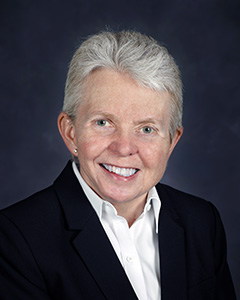
Margaret C. "Peggy" Burns
Margaret C. “Peggy” Burns, an engineering leader whose career has
included influential roles at IBM and Lockheed Martin and who is a
dedicated advocate for increasing diversity in STEM fields, will address the Class of 2023 at Drexel
University’s College of Engineering commencement ceremony on Thursday,
June 15 at the Mann Center for the Performing Arts.
Burns, who graduated from Drexel in 1979 with a degree in electrical
engineering, counts her time as program manager and director of the
teams that developed the Global Positioning System (GPS), which
millions of people use daily to find their way, as one of her greatest
career accomplishments. It’s an appropriate outcome for someone who
didn’t know what direction she wanted to go as a high schooler in
Pittsburgh.
“I didn’t know what I actually wanted to do with my life, except that
it had to involve math and science, because I liked those subjects,”
Burns recalled. “My mom knew someone who’s daughter went to Drexel who
was very complimentary of it, especially of the co-op assignments. I
applied and was accepted quickly, which I took as a sign.”
Though she started as a math major, it was a required computer class
that caught Burns’ attention. She struggled in the class at first, but
after working with peer tutors, she enjoyed the challenge, so she
signed up for a higher-level programming class the next term.
“This was not a class for freshmen, but I made friends with some folks
in their third and fourth year who convinced me to take a co-op at the
Pentagon and move to Washington with them for the term,” she said. “It
was there that things started to click – I could see myself doing this
computer stuff for a career."
On her second co-op, also at the Pentagon, she was assigned to a
different office, where she met a colleague who was a Drexel
engineering major.
“As far as I could tell, he was having all the fun,” she said. “His
projects still involved math, but they had practical applications. I
saw what I could do with everything I was learning. So as soon as I got
back to Drexel, I made a hard switch into electrical engineering. I was
a pre-junior at this point and had to catch up on a lot of classes, but
I kind of bullied my way through the year, took some things out of
order, and survived.”
Washington, D.C., became Burns’ home after graduation. She started
working at the phone company there but was quickly recruited to work
for consulting firm that was doing defense intelligence work. From
there, she worked at IBM on projects she can’t talk about to this day
but describes as “mind-blowing.” Then she moved on to Lockheed, where
she worked on her “signature project” for 12 years.
“They used to put a lot of digital noise in the GPS signal so that, if
you didn’t have military-grade equipment, you couldn’t get accurate
readings,” she explained. “I was there when the government switched
that off, and seeing the signal clearly for the first time…that’s one
of those moments that makes you cry.”
Burns is currently senior director and program manager for
Transportation Solutions in the Civil Group of Leidos, a security and
information technology company in Reston, Virginia. Her work is still
focused on guiding people, though perhaps not in the same manner as
GPS.
“I coach the folks on my team in how to manage their projects, and how
to deal with their customers, and how to deal with their problem
employees, and how to set themselves some objectives,” she said. “And I
help them find the path that they could use to get there. I also help
write proposals and act as a senior statesman who has background in all
the industries they touch. It’s a fascinating mix of roles.”
Helping young engineers isn’t just something that Burns does in her
job, though. She currently serves on the Drexel University President's Leadership Council and is chair of the Drexel Engineering Dean's Executive Advisory Council. She
wants to be sure that Drexel remains the kind of school that can
challenge students and help them get real-life experience while still
studying. She also endowed the
Margaret C. Burns Chair in Engineering
, which supports a faculty member who champions women, minorities, and
members of the LGBTQ community.
“I once was talking to a group of high school students – all girls –
and we were supposed to talk about STEM. And these kids had straight As
in all their math and science courses, but they didn’t want to become
engineers because they thought it was for geeks or they didn’t think
they belonged,” she said. “But I look at all the women, all the
cultural minorities, all the LGBTQ people I’ve worked with and the
value that they brought to the table, and I want to be sure that nobody
self-selects out of engineering because they think they don’t belong.”
Burns also says that encouraging more types of voices to join STEM
fields is crucial because of the diversity of issues that engineers
will tackle in the next 50 years.
“There's big problems out there,” she said. “There's communications.
There's climate change. There's the need for smart cities. And we need
to stop using all these carbon fuels because they'll run out one day.
And there's overcrowding. And there's not clean water. And you know
what? Those problems impact all different people. They don't impact one
tiny subset of people. And the solutions to them need to meet the needs
of all those different people, so we need their voices to help us
create the solutions.”
The College of Engineering commencement ceremony will be held on
Thursday, June 15 at 1 p.m. at the Mann Center for the Performing Arts.
For more information, see the
commencement website
.